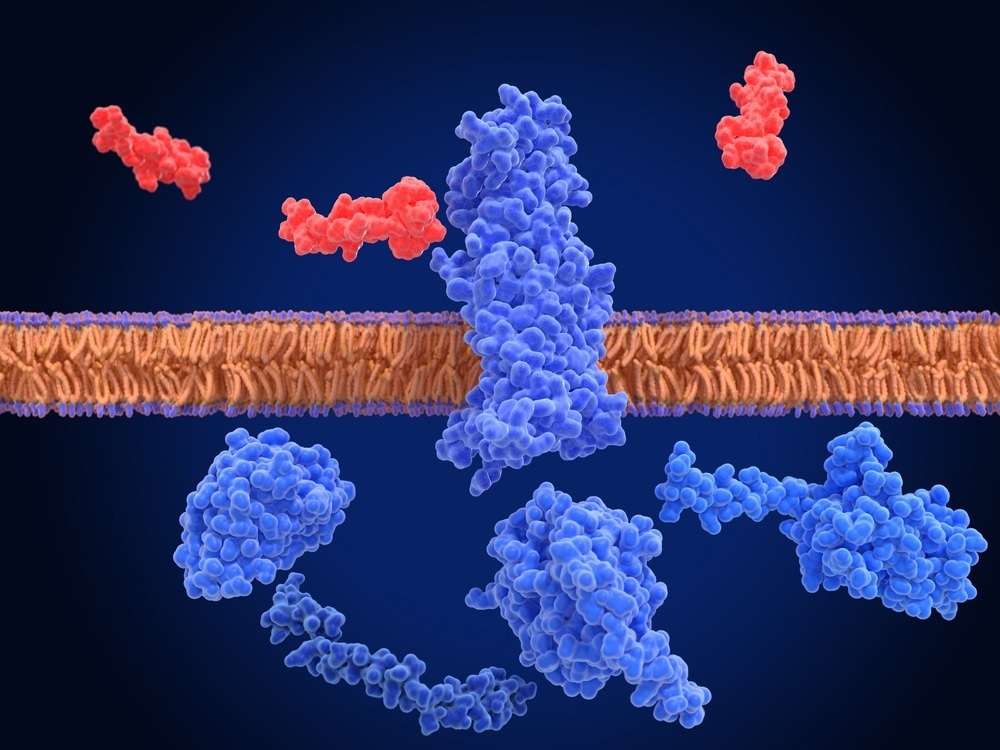What is semaglutide?
Efficacy of semaglutide: How well does it work for type 2 diabetes?
Safety profile of semaglutide: What are the risks and side effects?
Comparing semaglutide with other type 2 diabetes treatments
References
Further reading
One very successful drug for type 2 diabetes management is semaglutide. It works as a glucagon-like peptide 1 (GLP-1) agonist, stimulating insulin release and reducing glucagon secretion, which leads to improved blood sugar control. While generally safe and well-tolerated, semaglutide has potential side effects that warrant consideration.
What is semaglutide?
Semaglutide is a GLP-1 receptor agonist, mimicking the natural hormone GLP-1 that regulates blood sugar.1 It works by stimulating insulin release from the β-cell of the pancreas when blood sugar levels are high, helping it move into cells for energy or storage.2 Simultaneously, it suppresses glucagon secretion, a hormone that raises blood sugar, preventing unnecessary glucose release.1,2

GLP-1 receptor, inactivated and surrounded by an agonist (semaglutide, red) and G-proteins. The glucagon like peptide-1 receptor has a strong effect on the management of type 2 diabetes mellitus. Image Credit: Juan Gaertner/Shutterstock.com
Semaglutide also slows gastric emptying, preventing rapid blood sugar spikes after meals.1 This action, coupled with potential effects on appetite centers in the brain, contributes to increased feelings of fullness and reduced appetite.1
Interestingly, while semaglutide mimics the effects of GLP-1, studies suggest it primarily acts on GLP-1 receptors in the gut, not the brain.3 This is because most brain GLP-1 receptors are less accessible to the medication.3 Despite this limited direct action on the brain, semaglutide remains highly effective in reducing food intake and body weight, likely due to its peripheral actions and indirect influence on brain pathways.3
In general, this GLP-1 agonist has been shown to have effects on β-cell proliferation and neogénesis, inhibition of apoptosis (programmed cell death), cellular stress reduction, and insulin transcription, synthesis, and secretion.2 This multifaceted mechanism of action makes semaglutide a valuable tool in the management of type 2 diabetes.
Efficacy of semaglutide: How well does it work for type 2 diabetes?
In the treatment of type 2 diabetes, obesity, and cardiovascular risks, semaglutide has been a game-changer.
In the case of type 2 diabetes diagnosis, one of the standard tests is the A hemoglobin A1C (HbA1C) blood test, which shows the average glucose level coating hemoglobin.4
Several trials have been conducted to measure semaglutide effectiveness in reducing HbA1C, as well as its effects on obesity and cardiovascular risk. These are the SUSTAIN, STEP, and SELECT trials.5
In the SUSTAIN series of clinical trials, semaglutide consistently demonstrated significant reductions in HbA1c levels compared to placebo and other diabetes medications, such as sitagliptin6, exenatide ER7, and dulaglutide8.
The STEP program focused on semaglutide's efficacy in weight loss for individuals with and without type 2 diabetes.9 These trials demonstrated significant weight loss with semaglutide compared to placebo in adults with obesity.9

Image Credit: KK Stock/Shutterstock.com
Furthermore, the STEP trials highlighted the importance of combining lifestyle intervention with semaglutide for long-term weight management and improving cardiometabolic risk factors.9 These benefits were observed in individuals with obesity and cardiovascular disease, regardless of their diabetes status.9
Together, the STEP and SUSTAIN trials, along with the SELECT trial (an extension of the SUSTAIN program), have revealed a significant reduction in major adverse cardiovascular events (MACE) with semaglutide in both diabetic and non-diabetic patients.5,9,10
It's important to note that consultation with a healthcare professional is necessary to determine if semaglutide is appropriate based on a patient's medical history.
Safety profile of semaglutide: What are the risks and side effects?
Semaglutide offers significant benefits; however, it poses potential side effects and risks, with gastrointestinal symptoms the most frequent side effects, often occurring during the initial stages of treatment as the body adjusts.11 These can include nausea, vomiting, diarrhea, constipation, abdominal pain, and reduced appetite.11
Other side effects include hypoglycemia, especially when combined with other diabetes medications, fatigue, headache, and dizziness.11 People with a medical history of pancreatitis, thyroid tumors, diabetic rethinopathies, allergic reactions, and/or kidneys problems need to consult with their physicians before taking any of these medications.11
Comparing semaglutide with other type 2 diabetes treatments
Semaglutide is a newer diabetes medication compared to other drugs used for diabetes management. For example, metformin primarily reduces liver glucose production, while semaglutide is a GLP-1 receptor agonist that stimulates insulin release.1,12 Both lower HbA1c, but semaglutide typically leads to greater reductions and weight loss.13
Metformin may cause gastrointestinal side effects, which are usually less severe than with semaglutide.14 Semaglutide might be preferred when weight loss is a primary goal or when metformin doesn't adequately control blood sugar.
Compared to insulin, which directly replaces deficient insulin production, semaglutide stimulates insulin release in a glucose-dependent manner.2 Both effectively lower HbA1c, but insulin is often necessary in advanced type 2 or type 1 diabetes.15 Semaglutide may delay the need for insulin in some individuals.15
While hypoglycemia is common with insulin, it's less frequent with semaglutide.16 This may be preferred earlier in type 2 diabetes to promote weight loss and potentially preserve beta-cell function, while insulin is crucial when other medications fail to control blood sugar or in type 1 diabetes.16
Finally, compared to other GLP-1 receptor agonists like dulaglutide, semaglutide is generally more potent, longer-acting, and often leads to greater HbA1c reductions and weight loss.8 Semaglutide might be preferred when maximized efficacy is desired or when a once-weekly injection is preferable to daily or twice-weekly ones.8
References
- Holst, J. J. (2007). The physiology of glucagon-like peptide 1. Physiol Rev 87, 1409-1439. https://doi.org/10.1152/physrev.00034.2006
- Marzook, A., Tomas, A. & Jones, B. (2021). The Interplay of Glucagon-Like Peptide-1 Receptor Trafficking and Signalling in Pancreatic Beta Cells. Front Endocrinol (Lausanne) 12, 678055. https://doi.org/10.3389/fendo.2021.678055
- Trapp, S. & Brierley, D. I. (2022). Brain GLP-1 and the regulation of food intake: GLP-1 action in the brain and its implications for GLP-1 receptor agonists in obesity treatment. Br J Pharmacol 179, 557-570. https://doi.org/10.1111/bph.15638
- MedlinePlus. (n.d.) Hemoglobin A1C (HbA1c) Test, [Online] https://medlineplus.gov/lab-tests/hemoglobin-a1c-hba1c-test/.
- Aroda, V. R. et al. (2019). Comparative efficacy, safety, and cardiovascular outcomes with once-weekly subcutaneous semaglutide in the treatment of type 2 diabetes: Insights from the SUSTAIN 1-7 trials. Diabetes Metab 45, 409-418. https://doi.org/10.1016/j.diabet.2018.12.001
- Ahren, B. et al. (2017). Efficacy and safety of once-weekly semaglutide versus once-daily sitagliptin as an add-on to metformin, thiazolidinediones, or both, in patients with type 2 diabetes (SUSTAIN 2): a 56-week, double-blind, phase 3a, randomised trial. Lancet Diabetes Endocrinol 5, 341-354. https://doi.org/10.1016/S2213-8587(17)30092-X
- Ahmann, A. J. et al. (2018). Efficacy and Safety of Once-Weekly Semaglutide Versus Exenatide ER in Subjects With Type 2 Diabetes (SUSTAIN 3): A 56-Week, Open-Label, Randomized Clinical Trial. Diabetes Care 41, 258-266. https://doi.org/10.2337/dc17-0417
- Pratley, R. E. et al. (2018). Semaglutide versus dulaglutide once weekly in patients with type 2 diabetes (SUSTAIN 7): a randomised, open-label, phase 3b trial. Lancet Diabetes Endocrinol 6, 275-286. https://doi.org/10.1016/S2213-8587(18)30024-X
- Moiz, A. et al. (2024) Long-Term Efficacy and Safety of Once-Weekly Semaglutide for Weight Loss in Patients Without Diabetes: A Systematic Review and Meta-Analysis of Randomized Controlled Trials. Am J Cardiol 222, 121-130 (2024). https://doi.org/10.1016/j.amjcard.2024.04.041
- American College of Cardiology. Semaglutide Effects on Cardiovascular Outcomes in People With Overweight or Obesity, [Online] https://www.acc.org/Latest-in-Cardiology/ClinicalTrials/2023/11/09/15/04/select (2023).
- Drugs.com. Semaglutide, [Online] https://www.drugs.com/semaglutide.html (2024).
- Rena, G., Hardie, D. G. & Pearson, E. R. (2017). The mechanisms of action of metformin. Diabetologia 60, 1577-1585. https://doi.org/10.1007/s00125-017-4342-z
- Ji, L. et al. (2021). Efficacy and safety of once-weekly semaglutide versus once-daily sitagliptin as add-on to metformin in patients with type 2 diabetes in SUSTAIN China: A 30-week, double-blind, phase 3a, randomized trial. Diabetes Obes Metab 23, 404-414. https://doi.org/10.1111/dom.14232
- Drugs.com. (2024) Metformin Side Effects, [Online] https://www.drugs.com/sfx/metformin-side-effects.html.
- Spa, E. S. C. M. (n.d.)Semaglutide vs. Insulin: A Comparative Analysis in Type 2 Diabetes Treatment. . [Online]
- Thota S, A. A. (n.d.) [Online] (StatPearls Publishing, Treasure Island (FL), 2024)
Further Reading
Last Updated: Nov 14, 2024